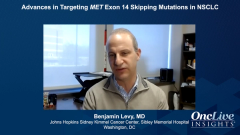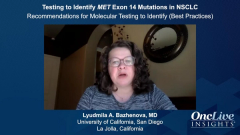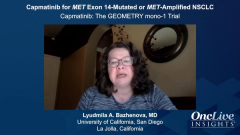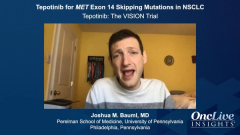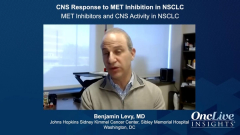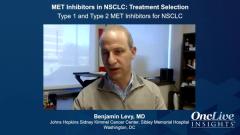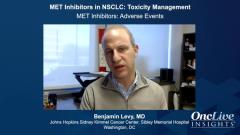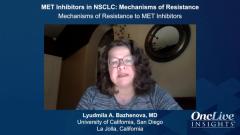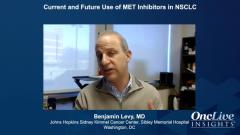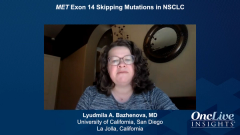
Capmatinib for MET Exon 14-Mutated NSCLC
Discussion on the FDA approval of capmatinib, a MET inhibitor, as treatment for patients with MET exon 14-mutated non–small cell lung cancer based on data demonstrated by the GEOMETRY mono-1 study.
Episodes in this series

Joshua M. Bauml, MD: Capmatinib is a MET TKI [tyrosine kinase inhibitor] with very high affinity and excellent CNS [central nervous system] penetrance, so this is a huge step forward for our patients with MET exon 14 skipping non–small cell lung cancer. In my opinion, this has become the standard of care based on its approval for patients in May of 2020.
Lyudmila A. Bazhenova, MD: The GEOMETRY mono-1 study was a multicohort phase 2 trial that looked at capmatinib in patients with MET-dysregulated advanced non–small cell lung cancer. Patients with MET exon 14 skipping mutations or MET amplifications, according to the gene copy number in tumor tissue, were enrolled. Patients received capmatinib dosed at 400 mg twice a day. The primary end point of the study was overall response, reported by a blinded independent review committee. Secondary end points were duration of response, progression-free survival [PFS], toxicity, safety, and other common end points of similar types of clinical trials.
So far, they have enrolled 364 patients with mutations in the trial. Among patients with non–small cell lung cancer and MET exon 14 skipping mutations, an overall response rate of approximately 41% has been seen. It is important to note that a majority of patients received 1 or 2 lines of therapy previously. In patients who were treatment-naïve, the response rate was 68%. However, it is important to pay attention to the fact that there were only 28 patients in that cohort. So it would be important to acquire more treatment-naive patients to be confident that the response rate is actually 68%. For patients who weren’t treatment-naïve, the response rate was 41%. The duration of response was 9.7 months in pretreated patients and 12.6 months in treatment-naive patients.
In the GEOMETRY mono-1 study, they also enrolled patients with MET amplifications who had a gene copy number of more than 10%. Investigators reported an overall response rate in that patient population of 29%.
Benjamin Levy, MD: I think there are some important key takeaways from the GEOMETRY mono-1 study evaluating capmatinib for patients with lung cancer. What we learned is that this drug elicits meaningful responses in patients who harbor MET exon 14 skipping mutations. We saw a response rate of close to 70% in the treatment-naive setting. That’s commensurate with what we see with other targeted therapies for other genotypes. We also saw a response rate of 40% in pretreated patients. And so, this drug has activity. These responses were noted to be durable—anywhere from 9 to 12 months—and translated into meaningful PFS metrics, when looking at how long these patients were able to remain on the drug.
Also, probably under-represented, while it’s a small number of patients, we also learned that this drug elicits meaningful responses in the brain. So taken together, this is another drug that we have in our therapeutic armamentarium. It’s a drug that should be considered. I would consider identifying MET exon 14 skipping mutations up front and using this drug in the first line.
Finally, the drug was well tolerated. When you’ve got a drug that’s got meaningful activity coupled with being well tolerated, this is where we’re trying to move the field in lung cancer and is how we’re trying to direct the science—with selective drugs that cause very little collateral damage and elicit meaningful response in the tumor. The key takeaways for me are this is an exciting advance for the field and is another drug that can and should be used for patients with MET exon 14 skipping mutations.
Transcript Edited for Clarity


